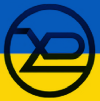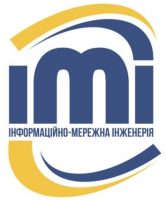Mobile Hardware and Software Laboratory
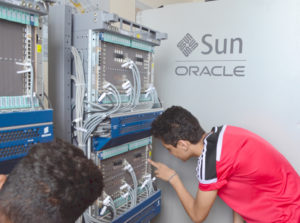
The laboratory is located in Room 401. The technical equipment for the laboratory was provided by Ericsson in cooperation with Lifecell. The laboratory equipment creates a mini mobile communication station complex, which is an exact copy of conventional stations, the project is implemented within the framework of its own project “lifecell universities”. This laboratory was opened in 2017. Similar equipment is used by the world’s leading communication companies, including Vodafone, Lifecell, Kyivstar. The set of equipment includes base stations, controllers, switching center server, OSS operation support system and power distribution module, SDN and PPA transmission. On the basis of this laboratory they conduct classes in the disciplines of basic and selective, studying mobile communication; automation, design and management of info-communication networks, information geostructure, IP-telephony and equipment of telecommunication networks.
Laboratory of electrical circuits, signals and circuitry
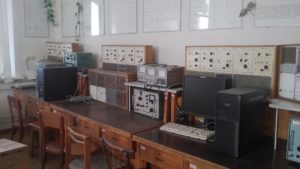
The laboratory is located in Room 402. In the 2002/2003 academic year, the laboratory of electrical circuits, signals and circuitry was recognized as the best training laboratory in KNURE. The combination of full-scale and computer modeling in the educational process, the possibility of studying various basic characteristics of radio devices and modes of operation of laboratory layouts became the main factors to the deserved recognition. For laboratory work the workplaces are equipped with either a separate sound frequency generator G3-56 / 1 (G3-102) and oscilloscope NMO1002 Rohde & Schwarz, or a personal computer equipped with a PCI plate-generator of signals of any shape type AGENT-230 and PCI board – oscilloscope BORDO-220 manufactured by AURIS (Belarus). These boards allow to replace expensive measuring devices and allow to generate and measure signals in control points of schemes with the subsequent entering them into computer memory. The studied signals can be subjected to additional mathematical processing by standard or original software with output to a multimedia projector. Thus, with the help of the original software developed in the framework of the research and development work, it is possible to measure the frequency characteristics of linear electric circuits with the help of the above mentioned PCI boards. Additional generator and measuring equipment (spectrum analyzers, frequency response meters, pulse generators, frequency meters) can be connected for specific studies in laboratory layouts. In the laboratory under the direction of teachers within the limits of research workings out of new laboratory breadboard models for research of principles of work of circuit nodes of devices of telecommunications on modern element base is constantly spent.
Laboratory of access networks based on PON technology
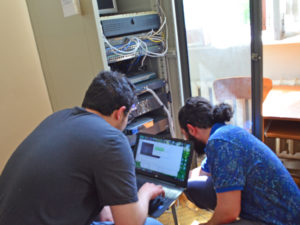
The laboratory is located in the 401st classroom. In this laboratory, exercises are conducted using portable equipment designed to demonstrate some types of work with optical fibers. It is a set of subscriber terminals (ONU), PON-switches (OLT), splitters, optical patchcords, which allow you to create demonstration models of the fiber optic network and explore the main characteristics of the created model. Equipment for this cycle of laboratory work was provided by LLC Trade House “Intertrade”, which specializes in telecommunications equipment.
The equipment provided by “Ukrtelecom” company is a set of apparatus for creation of welded joints of optical fiber and reflectometer to determine the quality of welded joints of optical fiber and measurement of signal attenuation in the welded joint.
On the basis of this laboratory they study disciplines, basic and selective, disclosing technologies of construction of information networks; management, the control and principles of transfer of info-communication networks.
Also in this laboratory on the basis of equipment Cisco, Siemens AG, Watson Telecom, D-Link, Intel, TP-Link, Linksys created a local network that connects computers using Wi-Fi access points. The leading segment of the network uses Fast Ethernet, providing data transfer rate up to 100 Mbps. The department’s local network is connected to the university’s network and to the Internet, which allows all computers of the department’s local network to have a high access speed and allows them to carry out high-quality laboratory work.
Educational Laboratory “Maxnet’s Lab”
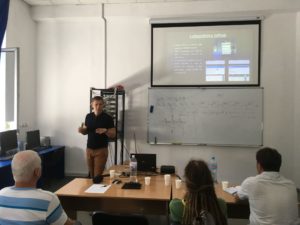
The laboratory is located in the 401a classroom. The complex of this laboratory is presented by the famous telecommunication company “Maxnet”. The laboratory was opened in April 2019. The set of laboratory equipment includes server equipment with the possibility of using cloud infrastructures. On the basis of this equipment, students have the opportunity to study disciplines, basic and selective, revealing the principles and technologies of DevOps, wireless information networks, routing of communication systems, cloud technologies, etc. The equipment includes server equipment, thin clients and a multimedia complex.
Internet-based info-communications laboratory
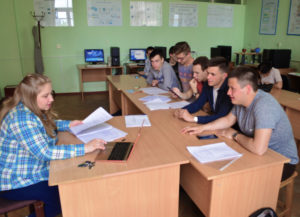
The laboratory is located in room 401b. The info-communications laboratory based on the Internet is equipped with personal computers with appropriate hardware and software. Carrying out of laboratory trainings in these laboratories assumes not only the special software, but also the standard complete set of programs. This combination has led to the technical equipment of the laboratory with the corresponding equipment requirements: increased capacity, expanded video card and RAM capacity for processing large amounts of information and additional software products that allow for high-quality training sessions. Students master IT-technologies, working with such software as MySQL, Workbench, Adobe Flash, SQL Server, Oracle, Netcracker, operating systems WINDOWS OS, Linux, UNIX. In the process of training students master special languages C, C ++, Pithon, Java, Javascript, HTML, PHP.
